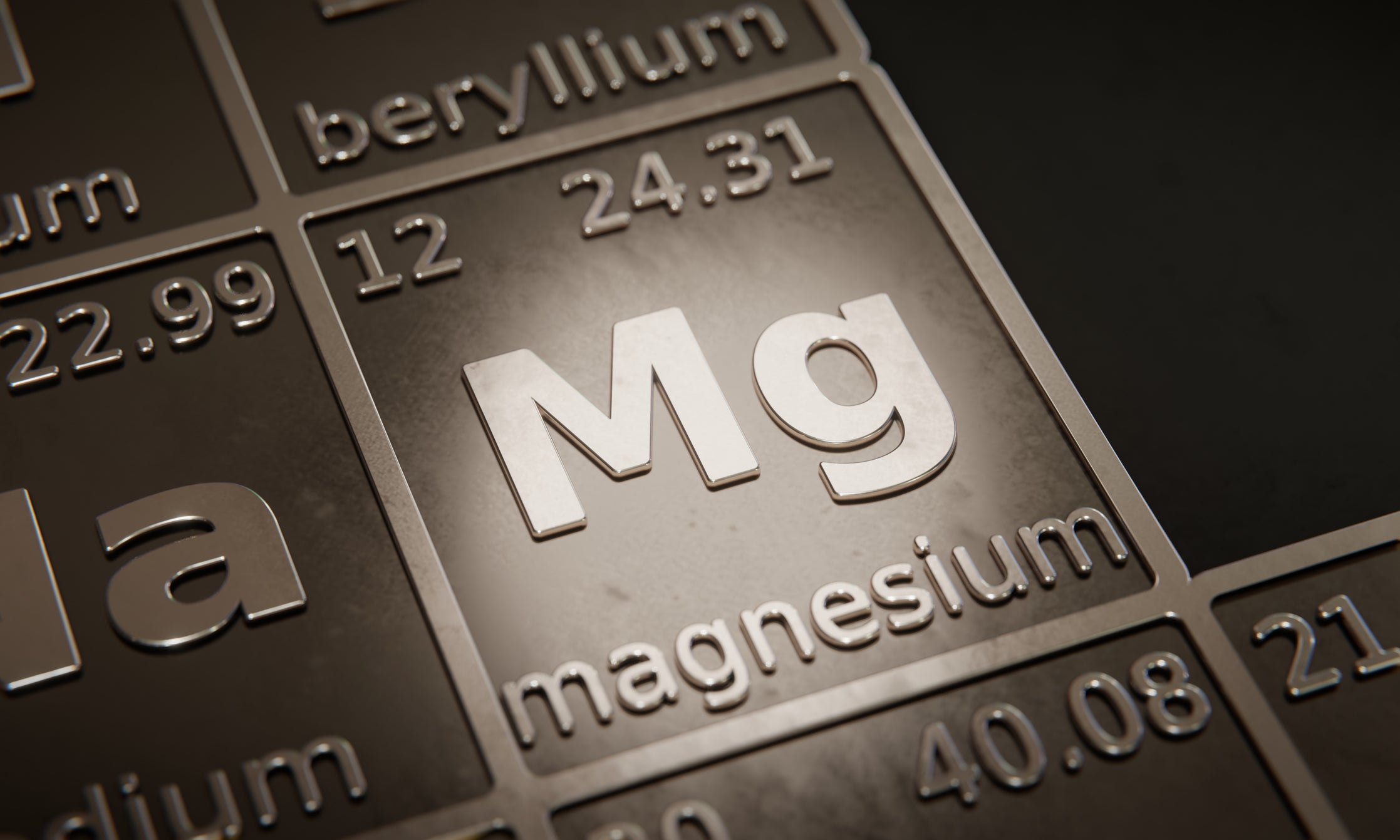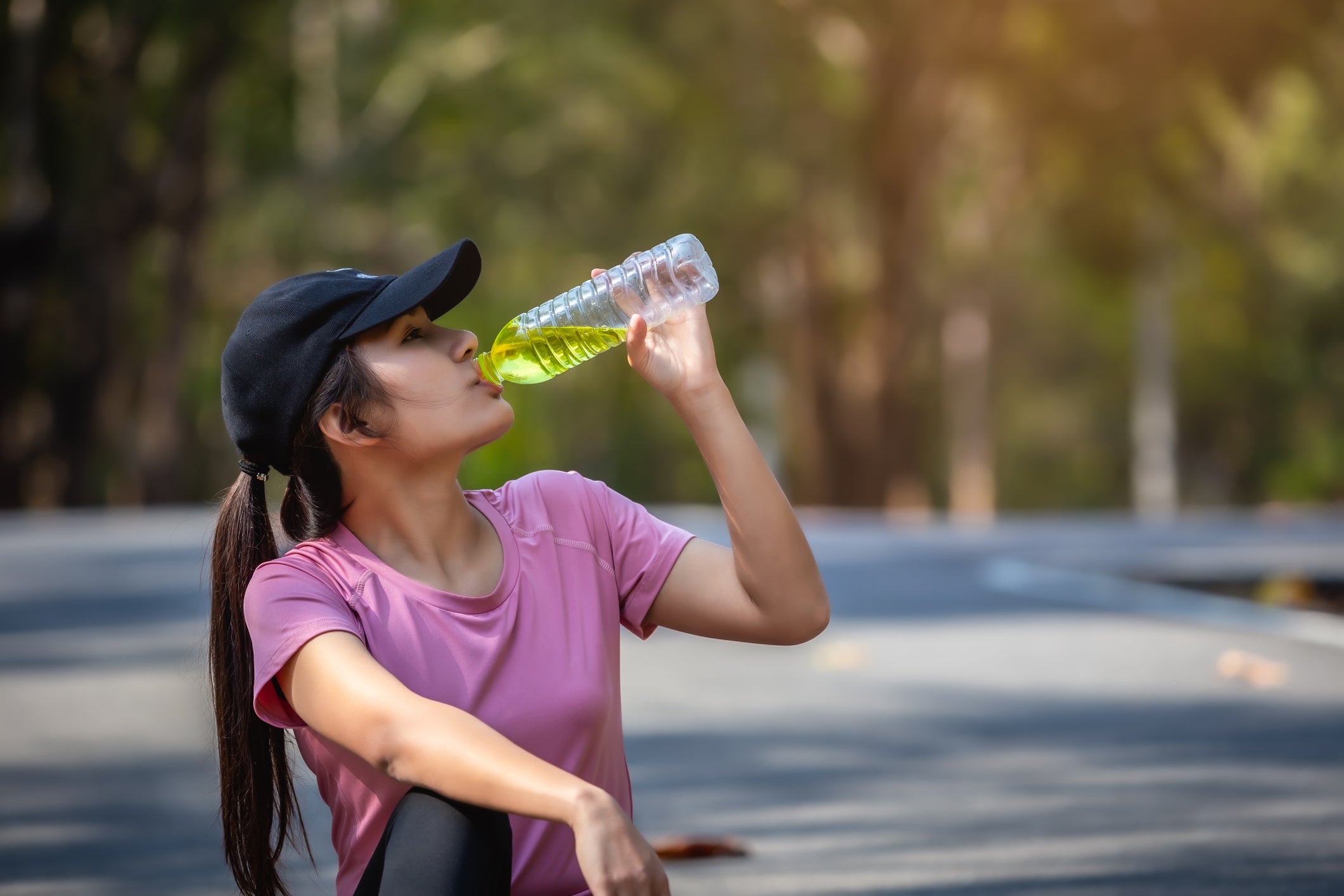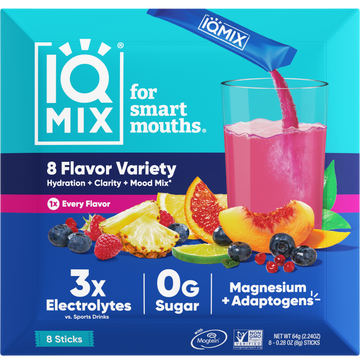Hydration multipliers are a type of supplement that increase your body's potential to absorb water and stay hydrated more effectively. These nifty concoctions fuse together vital electrolytes like sodium, potassium, and magnesium, and sometimes glucose.
As the creators of IQMIX—a keto-friendly hydration mix—we stand behind the notion that infusing your body with essential electrolytes boosts hydration efficiency. However, IQMIX stands apart from most of its competitors in one defining way. It's sugar-free! This deliberate choice is rooted in scientific research.
In this article, we’ll explain why sugar-packed electrolyte supplements aren’t needed for proper hydration, but first, let’s cover some hydration basics.
Hydration 101
Proper hydration involves a delicate balance of both water and electrolytes, as each plays an integral role in the functioning of our bodies. Let’s break these down individually.
Water
Water is the elixir of life, making up roughly 60% of the adult human body. It serves a variety of essential functions, including:[*]
- Regulating body temperature
- Aiding digestion and nutrient absorption
- Moistening tissues in the eyes, nose, and mouth
- Protecting body organs and tissues
- Cushioning and lubricating joints
- Facilitating waste elimination
- Supporting optimal brain function
- Dissolving minerals and nutrients to make them accessible to your body
The amount required may vary depending on factors such as age, activity level, climate, and overall health. Drinking water according to your thirst is generally a reliable approach that ensures adequate water intake.
The keyword here is “adequate,” as excessive water consumption can lead to hyponatremia—a condition characterized by a dilution of sodium in the blood.[*] This can lead to symptoms such as headache, nausea, muscle cramps, confusion, and even seizures or coma in severe cases.
Electrolytes
Electrolytes are minerals that regulate countless processes in the body. They allow us to think, move, and keep our hearts beating. They’re also essential for hydration. This is because they assist with the movement of water in and out of cells.[*]
We obtain electrolytes from the food and beverages we consume and eliminate them through sweat, urine, and feces. When there’s an imbalance in these processes due to things like heavy sweating, poor diet, or drinking too much water, it can result in an electrolyte imbalance.
Failing to properly replenish electrolytes can leave you feeling unwell with symptoms like fatigue, headaches, and muscle cramps. This is especially true for those who engage in fasting or adhere to low-carb or keto diets. Why? Because the kidneys excrete more sodium when the body is in a low-insulin state, which occurs when carbohydrate intake is reduced.[*]
Do You Need Sugar to Absorb Electrolytes?
In the pursuit of optimal hydration, you may have come across the idea that adding sugar to electrolytes can supercharge your body’s ability to stay hydrated.
To an extent, this is true—glucose does play a role in transporting sodium, chloride, and water across the intestinal barrier, which in turn helps with hydration.[*] In fact, in clinical medicine, administering a combination of glucose and sodium is referred to as oral rehydration therapy (ORT). This method has effectively rehydrated numerous individuals experiencing severe, often life-threatening dehydration.[*]
This fact has led some to claim that glucose is an essential ingredient for proper hydration, arguing that without it, your body will struggle to maintain the right balance of electrolytes and energy. This isn’t accurate.
While glucose can indeed be helpful for certain circumstances, most situations don’t require this added boost. In fact, your body can hydrate itself and maintain healthy electrolyte levels just fine without the need for glucose. That’s great news for those of us who choose to avoid sugar due to its links to pro-inflammatory states and subsequent adverse health effects.[*]
How the Body Maintains Hydration and Electrolyte Levels without Glucose
The electrolyte, sodium, is one of the key players in maintaining proper hydration, so let’s use this as an example.
Sodium is absorbed in the small intestine. As previously mentioned, glucose supports the absorption of sodium through intestinal cells, however, it’s not the only game in town. Other substances in the body can also help sodium be better absorbed. For example:
- Butyrate: Gut bacteria produce butyrate (a short-chain fatty acid) by digesting fermentable fiber, which comes from legumes, oats, and root veggies. This substance aids in the absorption of both water and sodium.[*]
- Amino acids: Consuming protein sources, such as meat, eggs, quinoa, and beans, boosts sodium absorption in the gut.[*]
- Phosphorus: This mineral helps move electrolytes through cells in both the large and small intestines. Phosphorus is plentiful in meat, dairy products, and beans.[*]
- Potassium and chloride: These electrolytes collaborate with sodium to support absorption of electrolytes and water in the body.[*]
But Doesn’t Sugar Provide Energy for Activity?
It’s a common belief that carbohydrates are necessary to fuel intense activity. This notion is logical, as high-intensity exercise relies on glycolysis, which requires cells to use glucose for energy.
However, it’s important to note that in a fat-adapted state (which is achieved on low-carb diets like keto), fatty acids—rather than glucose—supply the majority of energy needs, including those required for exercise. No carbs (aka sugar) needed!
An Ideal Hydration Formula
The main point to take home is that glucose can help support hydration and electrolyte levels, but you don’t need glucose to absorb electrolytes and water.
For those following a low-carb diet, those with diabetes, or those who avoid sugar for health reasons, choosing a high-quality, sugar-free electrolyte drink mix (aka hydration multiplier), such as IQMIX, is the best move.
Each packet of IQMIX contains the following:
- 500 mg sodium
- 450 mg potassium
- 750 mg Magtein®, a clinically studied form of magnesium (Mg L-Threonate) that crosses the blood-brain barrier[*]
- 250 mg of super-concentrated lion’s mane mushroom, which supports brain health and function[*]
IQMIX is a safe choice for low-carb dieters or those with diabetes, as it contains only 3 grams of carbs and zero sugar. For a touch of sweetness, IQMIX uses stevia leaf extract. Compare this to most traditional sports drinks on the market, which contain about 40 grams of sugar per bottle.
IQMIX powder packets are available in great-tasting flavors, including Peach Mango, Lemon Lime, Blueberry Pomegranate, and Blood Orange. Try our 8-Stick Sampler to find your favorite flavors!
Simply pour a single-serving of IQMIX electrolyte powder into water to instantly create a revitalizing hydration drink. IQMIX is excellent for hydrating and replenishing pre- and post-exercise, while spending time in the sun, or for anytime wellness.
Get started with optimizing your hydration strategy today!
Written by Katie Koschalk, a health and wellness writer, certified holistic nutritionist, and certified personal trainer based in California.




